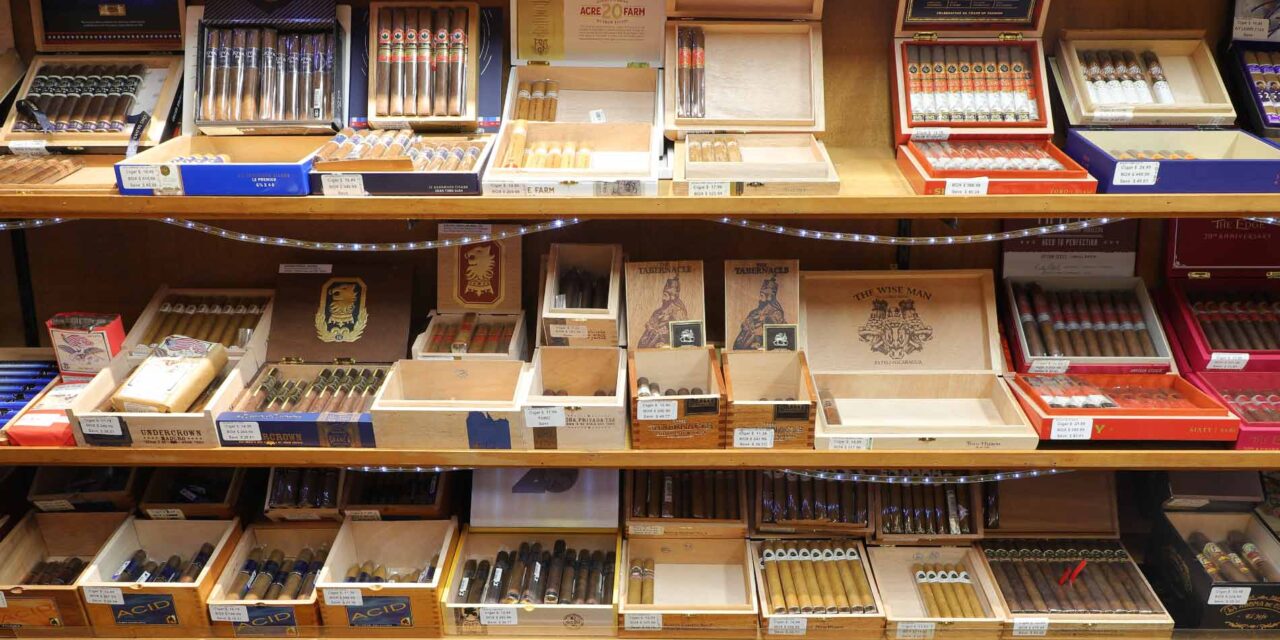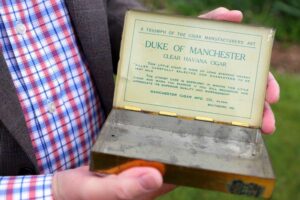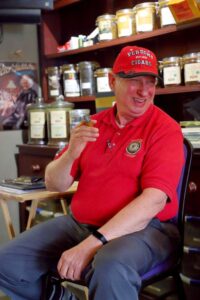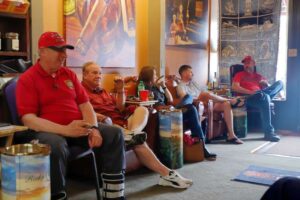by Linda L. Esterson, photography by Nikola Tzenov
Cigar Smoking Promotes Camaraderie and Friendship
It’s the modern-day version of Cheers, only instead of a bar, it’s a lounge. Comfortable leather chairs replace the wooden bar stools. Pleasantries are shared, names are known, and laughter fills the room. These customers have put the alcohol aside and instead puff happily on cigars.
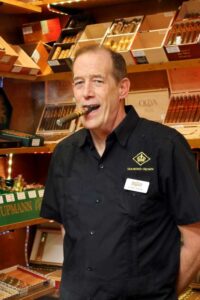
Tom Canon runs the Westminster store of Davidus Cigars and has seen the growth in interest of enjoying cigars.
In advance of Father’s Day, we take a look at the popularity of cigars and the trend of cigar lounges, which began popping up in the mid-1990s, when jurisdictions banned indoor cigarette smoking. Also referred to as cigar bars, these establishments often garnered an exception to smoking ordinances, and today they have become a mainstay of American culture.
“Dad has enough ties and socks,” jokes Tom Canon, senior manager and offsite event coordinator for Davidus Cigars, which has cigar stores with lounges in Eldersburg and Westminster, and 10 other locations in Maryland. “What he wants is consumables, with cigars at the top of the list.”
Although he jests, the numbers tell the story of the interest in cigars. The Westminster store sells over 100,000 cigars each year.
About 80 percent of Canon’s customers are fair-weather or occasional smokers, who purchase up to four cigars a month. Before he joined the company over eight years ago, Canon, too, was an intermittent participant, partaking in the pastime during the summer, and at parties, weddings, other special occasions, or while on the golf course. He frequented the monthly Puff & Pint event at O’Lordan’s Pub, also in Westminster, and it was there that he learned that Davidus was hiring. He retired from his office job and became a Davidus associate, then director of marketing and events and later general manager, before opting to run the Westminster store.
Where everyone knows your name
The remaining 20 percent of his customers, Canon says, are regulars, who come by several times a week and get comfortable in one of the store’s two lounges. No matter their age, gender, religion or political affiliation, they find commonality in their love of “sticks.”
“A cigar lounge is a unique place in this world today,” he says. “It’s one of the few places where everybody still gets along, because you can come in and you can discuss everything. We solve the world’s problems every day. And the worst that it ever gets is we may agree to disagree on a solution. But everybody gets along.”
John Pensmith, 30, first tasted a cigar at age 18 but got more involved about seven years ago. He started frequenting a cigar lounge soon after, for the sense of community, the networking and the chance to relax. Pensmith, who repairs, maintains and installs gas station equipment, says the lounge is one of the few places he can meet people who are from “wildly different walks of life.
“One of my favorite cigar shop memories was in the backroom at the Eldersburg shop, and we had a youth pastor, a bricklayer, an engineer and a New York City strip club manager all hanging out in the same shop and talking to each other,” he says. “It’s not something you find anywhere else.” Despite their differences, all find a camaraderie in their shared interest.
“I’ve never gone to a cigar lounge without at least one new friend coming out of it,” Pensmith says.
Tom Willis, 46, agrees.
“I’m an HVAC technician. I can be sitting next to a brain surgeon, and we can have great conversations because this brought us together,” he explains. “Otherwise, we would have never known each other. You get so many personal experiences and [make] so many friends who become lifelong friends.”
The attraction for Willis is the flavor profiles of the cigars. Akin to coffee and its different blends and roasts, cigars contain similar properties based on age and the type of tobacco, grown in different soils in regions all over the world. Unique tastes hail from South America, Nicaragua, Honduras and, of course, Cuba.
The Carroll connection
Long before cigars were imported from abroad, Carroll County was in fact a manufacturing hub for the tobacco product.
“Cigar factories were a major economic driver for Carroll County,” says Joe Getty, former executive director of the Historical Society of Carroll County, who authored an article on the manufacturing of cigars in Manchester published in the society’s Carroll History Journal this winter. “It’s a fascinating slice of history for one of Carroll County’s small towns to have such a burgeoning economy centered around cigar-making at a time when cigars were becoming prevalent in the country.”
Getty’s research was published about 15 years ago as a series of articles in the Northern News, a local newspaper serving Manchester and Hampstead. He found that cigar manufacturing in Manchester dates back to the mid-1800s. By 1883, a census report on the national tobacco crop indicated that Maryland ranked sixth among states for cigar production, with Baltimore the sixth-largest production city in the nation.
 Manchester became a hub as well, with the 1880 census listing 19 people in Manchester as “segar makers.” In 1900, when Manchester’s total population was 609, there were 151 people who worked in the industry, as “cigar makers,” “tobacco strippers,” “cigar packers,” and “cigar salesman.” The factories occupied buildings with workers hand-rolling the cigars upstairs. Getty estimates that each month, the workers hand-rolled 10,000 to 15,000 cigars, which were retailed regionally and shipped to the West Coast.
Manchester became a hub as well, with the 1880 census listing 19 people in Manchester as “segar makers.” In 1900, when Manchester’s total population was 609, there were 151 people who worked in the industry, as “cigar makers,” “tobacco strippers,” “cigar packers,” and “cigar salesman.” The factories occupied buildings with workers hand-rolling the cigars upstairs. Getty estimates that each month, the workers hand-rolled 10,000 to 15,000 cigars, which were retailed regionally and shipped to the West Coast.
According to Getty’s report, the 1902 national directory of cigar manufacturers listed seven companies in Manchester. By 1910, the Business Directory, a supplement to the Democratic Advocate, cited Manchester for its “highest elevation of any town in the county … and is the centre of the cigar manufacturing industry of Carroll County. About two hundred people are employed in the manufacture of many millions of cigars annually.”
By the 1920s, many of the local factories were bought and consolidated with Baltimore and out-of-town manufacturers, which produced machine-rolled cigars and proved more economical operations. A few factories remained in Manchester, but by the 1940s, cigarette companies also were booming, with interest climbing after free cigarettes were distributed to the troops during World War I. That, coupled with the Great Depression, fueled the demise of the Manchester factories.
The Appeal
Walter Cukier, representative in four states for Perdomo Cigars and fondly referred to as “Uncle Wally” by Canon and many of his customers, concedes that he, too, wasn’t always a cigar smoker. During his first sales job, he was handed a cigar and told to learn to smoke. Although finding it initially unpleasant, after sharing different cigars with his coworkers, he was hooked.
“We tried one box, then something different, and after that I was very interested in continuing to smoke cigars because it was fun,” he says. “Every time you walk into a humidor (a room controlling humidity), it’s like an adult candy store. And everybody likes candy but [there are many] different kinds.”
Jenna Sellers, a rare woman among the many male customers at Davidus, prefers a full-bodied cigar, with earthy profiles, citing leathery chocolate, coffee and spicy flavors among her favorites. Sellers, 54, employed as a human resources officer, frequents Davidus regularly for the sense of community but also the “enjoyment of a good stick.” She sets aside a few hours when she’s at the lounge to fully finish two cigars, she says.
Cigar smoking is also about tradition for her, having been introduced to the pastime by her grandmother 40 years ago, and she’s passed the love for cigars on to her son as well. She says she always feels welcomed by the men in the group, but certainly isn’t in the minority amongst her friends.
“I have four or five female good friends who smoke, and it’s not like any one of us got the other into it,” she explains. “We discovered through socializing that we all enjoy cigars. So now when we are able to get together, a lot of times it will be specifically to sit down and smoke and talk and have a couple of drinks.”
Cigars also serve a therapeutic purpose. Sellers enjoys sitting outside at home, after a long day at work, with a drink and a cigar to unwind and watch the sunset.
Billy Bailey, 67, looks to the hobby for relaxation, after being introduced while at Daytona Beach for Bike Week after his wife passed away in 2013. Two years later, he lost his daughter, and turned again to cigars, and soon after stayed with it full time for comfort and relaxation, he says.
Canon, the store manager, adds that smoking cigars reduces stress. Whether being at the lounge with friends or smoking alone while reading a good book or watching a movie, it provides a pause for life’s pressures and worries.
“While I can’t say smoking is healthy, reducing stress is huge,” he attests.
Cigar smoking, in fact, has been proven to be quite unhealthy. Despite a smoker’s option to not intentionally inhale, there is still danger from the carcinogens in tobacco that affect the mouth, throat and other respiratory organs. Smoking is tied to higher mortality, cardiovascular disease, chronic obstructive lung disease, cancer, susceptibility to respiratory infection, adverse reproductive outcomes and other diseases, according to the Department of Health and Human Services, the surgeon general and other health organizations.
Despite the dangers, enthusiasts persist, and the hobby promotes camaraderie and ultimately helps to build relationships.
“Conversation is getting to be a lost art,” says Canon. “I’ve built what I hope will be some lifelong friendships coming out of the cigar world. … We’ve been through enough together in life, up and down the line, good, bad and ugly.”

